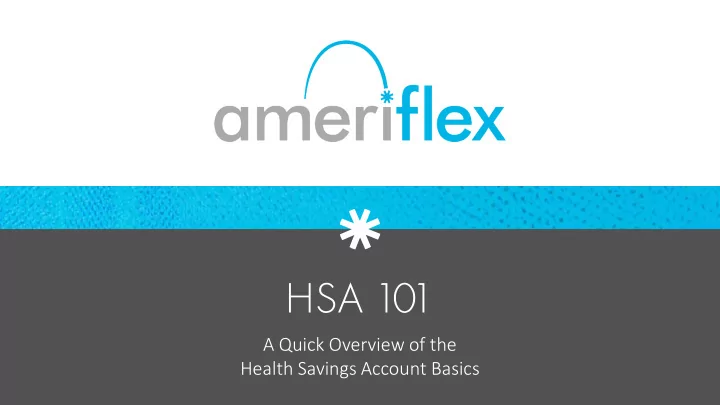

HSA 101 A Quick Overview of the Health Savings Account Basics
Agenda Health Savings Account Features HSA Eligibility Contributions Tax Information Distributions HSA-Qualified Expenses Paying for Medical Services Resources
There are two components to the HSA solution: High gh-Ded Deductible H e Health I Insur surance P e Plan ( (HDH DHP) paired with a Health h Saving ngs a accoun unt ( (HSA SA) Protects you from big medical bills High Deductible Insurance (HDHP) Helps pay your deductible Health Savings + Account Plan Tax-deductible deposits Health Savings Account Tax-deferred growth (HSA) Tax-free for medical care Health Savings Accounts
HSA Key Features Use HSA dollars to pay for medical expenses tax-free Funds roll over year to year Funds are portable HSAs are owned individually No “use it or lose it” rule HSAs earn interest Funds can be invested HSAs can build up significantly – no balance limit Health Savings Accounts
HSA Eligibility To open and/or continue contributing to a Health Savings Account, the account holder must meet this criteria: Must be en e enrolled i in a an HSA-qu qualif lified ied H High-Deduc uctible ible • He Health th Pl Plan ( (HD HDHP) Cannot be cover ered ed b by a any o other er i insurance e that • reim imburses es f for h healt lth e h expe penses es (including a medical FSA) Cannot be enr nrolle lled i in any p part o of Me Medic dicare o or Me Medic dicaid id • Cannot be claim imed d as a a d depe epend ndent on another person’s • tax return Must be over 18 years of age • Health Savings Accounts
2019 HSA Contribution Limits 201 201 9 Self $ 3, 50 0 Fa Family $ 7,00 0 No Note: Individuals over 55 years old can contribute an additional $1,000 annually to their HSAs. Health Savings Accounts
IRS Contribution Rules HSA Contributions are not subject to income tax Contributions can be made by anyone You can change your contributions at any time throughout the year Contributions in excess of the allowable limits must be withdrawn (otherwise incur a 6% excise tax and claim as income) Eligible individuals ages 55 or older may contribute “catch-up” contributions of $1,000 e 00 each ye year until enrolling in Medicare (one catch- up per account) Health Savings Accounts
How HSA Contributions Impact Taxes HSA c contributions a ns are e exem empt f from t the he follo ollowing payroll ll t taxes: Social Security • Medicare • Federal income tax • State income tax/unemployment tax (with • the exception of California) Pre-tax contributions facilitated by an employer are documented on an employee W-2 in Box 12 with a Code “W.” Health Savings Accounts
Annual Tax Documentation IRS Form 8889: 8889: Account holders utilize this form to file taxes. All information to file taxes is available through your bank account information and your employer W-2. IRS Form 1099 1099-SA SA: Details all distributions from the HSA. Customer and IRS receive by January 31. IRS Form 5498 5498-SA SA: Details all contributions into the HSA. Customer and IRS receive by May 31. Health Savings Accounts
What Can You Do with Your HSA Dollars? According to IRS guidelines, funds within your HSA can be used fo for qualif ifie ied m medic ical expenses ex es (See https://www.irs.gov/pub/irs-pdf/p502.pdf Publication 502). HSA dollars may y be used ed b by the a e account h holder er, t the a e account holder’s s spouse, e, a and a any t y tax ax depen enden ents. Distributions can an b be taken en at at a any t y time; HSA reimbursements can be taken for expenses from prior years as long as the account was already established. Save y your r receip ipts! ! Account holders are responsible for maintaining receipts to prove HSA funds were used for qualified medical expenses if audited by the IRS. Health Savings Accounts
Qualified Medical Expenses Doctor and hospital visits Medical-related transport Medical equipment Premiums for long-term care insurance Limited to amounts listed in 213(d) 10 of IRS Code Dental care, braces, dentures • Premiums for COBRA Vision care, glasses, contacts Premiums for individuals over the age of 65 Medications, including many Retirement health benefits • over-the-counter Medicare premiums • Health Savings Accounts
Non-Medical HSA Distributions Under er A Age 6 e 65: 65+ Yea ears Ol Old: It is possible to withdraw funds, No pe pena nalties f for no non-qua uali lifie ied d but not advisable. Mus ust pa pay di distribu butions ns. . Pay only income taxes inc ncome t taxes pl plus us 20% pe pena nalty o on n on those dollar amounts withdrawn the he no non-medic ical l doll llar amoun unt. for non-medical items. Health Savings Accounts
Payment Process Payment t to a Me Medic ical S l Servic ice P Provid ider ( (Doctor, L Lab or Ho Hospit ital, e etc.): Provide your insurance card & explain you have an HDHP. Most physicians allow you to pay after you receive their bill. Match your bill to the EOB (Explanation of Benefits) sent by your insurance. Paym ymen ent at at t the P e Phar armacy: Pharmacies immediately access the rate for prescriptions. You can use your HSA debit card to pay for qualified expenses, or pay with another method and reimburse yourself later. SAVE YOUR RECEIPTS Paym ymen ent A Arran angem emen ents: in case of audit! Medical bills can often be broken down into smaller payments. Set up payments directly from your HSA as needed. Health Savings Accounts
THANK YOU!
Recommend
More recommend